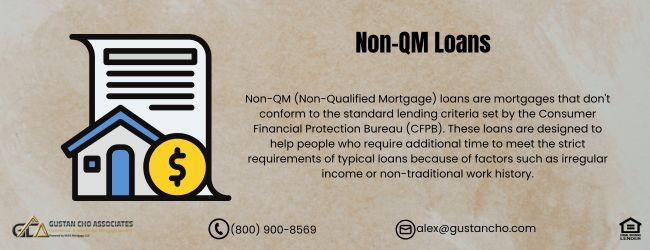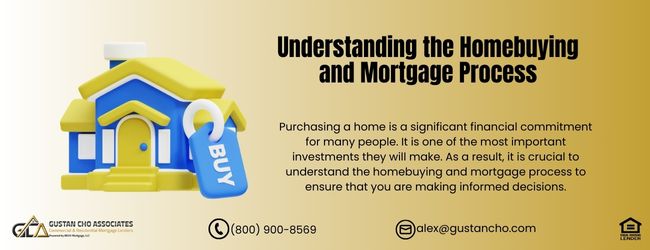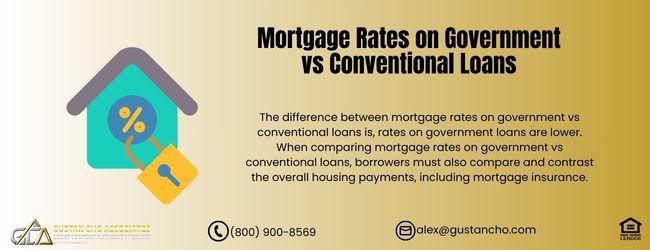Non-QM Loans

Non-QM loans are becoming one of the most popular mortgage loan programs for owner-occupant borrowers, second-home buyers, and real estate investors needing financing on investment properties. Non-QM loans often referred to as non-prime mortgage loans, are portfolio loans that do not have to abide by the federal agency mortgage guidelines of HUD, VA, USDA, Fannie Mae, and Freddie Mac. Borrowers of non-QM loans are not necessarily borrowers with bad credit. You can have perfect credit; a non-QM mortgage may be better. The following sections will cover what non-QM loans are and how they work.
What Are The Differences Between QM and NON-QM Loans?
If you find yourself looking for a mortgage, there are two different types you are likely to come across. These types are qualified mortgage loans and non-qualified mortgage loans. Today’s topic explains non-qualified mortgage loans, commonly known as non-QM loans. Not getting a qualified mortgage loan is not a big deal. Some professions are disadvantaged due to the guidelines of said qualified mortgage loans. Qualify for Non-Qm loans with us
Are NON-QM Loans A Safe Option For Homebuyers?
There are many types of mortgage loans in today’s marketplace. However, on owner-occupant mortgage loan products, there are two classifications: Qualified Mortgage and Non-Qualified Mortgage. Non-QM or non-qualified mortgage loans are currently still a safe option. Non-QM loans still have protections for the borrower.
All federal guidelines apply to all owner-occupant primary home mortgage loans. However, non-QM loans it has fewer guidelines and documentation requirements to get the loan.
In an ideal world, you could always get a qualified mortgage loan with all of its protections and guidelines included. But life is far from ideal and as will be shown. A non-qualified mortgage loan is still a safe option that allows you to proceed to obtain a home. No two lenders have the same guidelines on non-QM loans. Non-QM mortgage lenders are portfolio lenders. Wholesale non-QM lenders can make exceptions on guidelines if there are compensating factors.
What Are Non-QM Loans?
Simply put, a non-qualified mortgage loan is a loan that does not follow the lending guidelines put in place by the CFPB. The CFPB, or Consumer Financial Protection Bureau, is essentially a federal agency that ensures you have proper protection and treatment from banks and lenders. Now, this might not seem like something you would want, but going against the protections of a government agency that protects you in the deal seems like a bad idea. However, due to the strictness of traditional mortgage guidelines, you might not qualify for a traditional loan. A non-QM mortgage loan may be your only option. Click here to qualify for a Non-Qm loans
Non-QM Loans versus Other Loan Programs
Non-QM (Non-Qualified Mortgage) loans are mortgages that don’t conform to the standard lending criteria set by the Consumer Financial Protection Bureau (CFPB). These loans are designed to help borrowers who may need to meet the strict requirements of conventional loans for various reasons, such as irregular income or a non-traditional employment history.
Key Features of Non-QM Loans
Non-QM loans allow for alternative forms of income verification, such as bank statements, asset depletion, or profit and loss statements, rather than relying solely on W-2s and tax returns. Non-QM loans often accept higher DTIs than conventional loans, which can benefit borrowers with significant debt and substantial income. Non-QM loans can accommodate borrowers with lower credit scores than traditional loans, although some minimum credit score requirements still apply.
Types of Non-QM Loans
Non-QM loans are ideal for self-employed individuals, real estate investors, foreign nationals, and those with significant assets but irregular income streams. Due to the higher risk associated with these loans, they usually come with higher interest rates than conforming loans. Down payment requirements for non-QM loans are generally higher, ranging from 10% to 20%.
Bank Statement Loans
Designed for self-employed borrowers who use bank statements (usually 12-24 months) to verify income instead of traditional tax documents.
Asset-Based Loans
Also known as asset depletion loans, these are for borrowers with substantial assets but limited regular income. Lenders use the borrower’s assets to determine qualification.
Interest-Only Loans
Borrowers pay only the interest for a set period before paying both principal and interest. This can lower initial monthly payments but may result in higher payments later.
Foreign National Loans
Designed for non-U.S. citizens who wish to purchase property in the United States, these loans accept alternative forms of documentation and verification.
Investor Cash Flow Loans
These loans qualify borrowers based on the cash flow generated by an investment property rather than personal income, focusing on the property’s rental income.
Benefits and Drawbacks of Non-QM Loans
Benefits: Non-QM loans provide flexible income documentation options, making them accessible for borrowers with unconventional income sources. Homeownership Opportunities enable homeownership for individuals who might not qualify for traditional loans. Diverse Options: Various non-QM loan types cater to different financial situations and needs. Drawbacks of non-QM loans is higher interest rates: Non-QM loans generally have higher interest rates than traditional mortgages due to increased risk. Larger Down Payments: Higher down payment requirements can hinder some borrowers. Stricter Terms: Non-QM loans may have stricter terms and conditions in certain areas, such as prepayment penalties.
How to Qualify for a Non-QM Loan
Credit Score: Ensure your credit score meets the lender’s requirements. While non-QM loans are flexible, a higher score can improve your chances and lower your interest rate. Be prepared to make a substantial down payment. Saving at least 10-20% of the property’s value is advisable. Provide proof of stable income through alternative documentation methods like bank or asset statements. Maintain a reasonable DTI ratio to improve your chances of approval. Property Appraisal: Ensure the property is appraised to determine its market value, influencing the loan amount the lender is willing to offer. Lenders may require you to have significant cash reserves to cover several months of mortgage payments. Click here to qualify for a Non-Qm Loan
Why Go With Non-QM Loans?
If you cannot meet government or conventional agency mortgage guidelines, non-QM loans may be the best option. Many borrowers who cannot qualify for a qualified mortgage have a second chance of getting approved with non-QM loans. Without non-QM loans, certain people would not even be able to purchase their homes. The option of non-qualified mortgages is valuable for homebuyers and real estate investors. Even though you do not qualify for a qualified traditional FHA, USDA, VA, or conventional loan does not mean you cannot qualify for a mortgage with a non-QM loan.
Who Benefits From Non-QM Loans?
We have covered that those not meeting federal agency guidelines need a non-qualified mortgage loan. But what are these guidelines, and who would not fit these definitions? The guidelines for having a qualified mortgage loan follow one simple rule. That rule is your ability to repay. If you can show financial records showing that you should be able to repay the loan, you will likely end up with a qualified loan.
What Is The Ability To Repay Rule on Qualified Mortgages
The requirements for showing the ability to repay the loan are mostly based on credit and income documentation. Some examples of people who would struggle with this are borrowers with less-than-stellar credit, Self-employed borrowers, Real estate investors, Foreign nationals, Small business owners, people with a high DTI ratio, Gig workers, freelance workers, Independent contractors, and Retirees. These borrowers typically run into issues with credit scores or their income. Of course, the people needing a non-qualified loan are not limited to the abovementioned situations. They are just common examples and generalizations to show you what fields might run into issues.
The Difference Between QM loans and Non-QM loans
As covered before, it is significantly easier to receive a Non-qualified loan, possibly the only option for people that fall into certain categories. But once you have either loan, what is the actual difference in practice between the two loan options? The significant advantage of non-qualified loans is that they have much more flexibility. Non-QM loans are a viable option for borrowers who do not meet the traditional lending criteria of qualified mortgages. They offer flexibility in income documentation, credit scores, and DTI ratios, making them suitable for self-employed individuals, investors, and those with unique financial situations. However, it’s essential to consider the higher costs and potential risks associated with non-QM loans before deciding. Consulting with a mortgage professional can help determine if a non-QM loan is right for your circumstances. Get Eligible for Non-Qm loans with Gustancho Assoicates
What Is Negative Amortization?
You can have negative amortization: Amortization means paying off a loan with regular predetermined payments so that the amount you owe goes down with each payment. Negative amortization means that even when you pay, the amount you owe will still go up because you are not paying enough to cover the interest. This cannot be very clear, so let’s see an example. If payment is for one-thousand dollars and you can only afford to pay eight-hundred dollars, then two-hundred dollars would be added to the loan’s principal amount. And although this is not ideal, it can save you from missing a payment.
Interest Only Payments on Non-QM Loans
Non-QM advantages also include terms extending for over thirty years and interest-only payments. However, some drawbacks can occur from taking a non-qualified loan. These drawbacks include High-Interest rates and Fees. Non-QM loans usually come with high-interest rates and fees due to the lending risk associated with this type of mortgage. This means you may end up paying more in interest. Being difficult to find: Not all mortgage lenders offer non-QM loans, so they may be harder to find. You can search online for non-QM lenders and research before working with one. Greater risk of default: Non-QM loans such as interest-only mortgages, where you must pay only interest over a certain period, may increase your default risk.
Down Payment Requirements on Non-QM Loans
Higher down payments: Down payments for non-QM mortgage loans are usually higher than other mortgage products. Lenders require a sizable down payment to lower their lending risk if they cannot pay. This is reasonable, though, because by taking this loan, it is established that you do not have significant enough financial documentation to be trusted to pay back the loan as much as you would be in a qualified loan.
Qualified Versus Non-Qualified Mortgages
Qualified mortgage loans and non-qualified mortgage loans both have their distinct advantages and disadvantages. You will likely have a safer and cheaper experience with a qualified mortgage loan. But the real advantage of total mortgage loans is that they still allow underqualified people to be approved. And at the end of the day, getting the loan means that you will be able to be the proud owner of your dream home. So if you can not get the ideal qualified mortgage loan, the total mortgage loan is always a safe fallback option to get a mortgage and thus own a home. Speak With Our Expert for Non-Qualified Mortgage Loans
FAQs: Non-QM Loans
- What are Non-QM Loans? Non-QM (Non-Qualified Mortgage) loans are mortgages that don’t conform to the standard lending criteria set by the Consumer Financial Protection Bureau (CFPB). These loans are designed to help people who require additional time to meet the strict requirements of typical loans because of factors such as irregular income or non-traditional work history.
- How do Non-QM Loans differ from QM Loans? The main differences between QM (Qualified Mortgage) and Non-QM loans are the guidelines and flexibility. QM loans follow stringent guidelines set by federal agencies like HUD, VA, USDA, Fannie Mae, and Freddie Mac. Non-QM loans do not adhere to these guidelines, allowing for more flexible qualification criteria, such as alternative income verification and higher debt-to-income (DTI) ratios.
- Are Non-QM Loans safe for homebuyers? Yes, non-QM loans are still considered safe. They offer protections for borrowers, although they come with fewer guidelines and documentation requirements than QM loans. Non-QM lenders often act as portfolio lenders, meaning they retain the loans instead of selling them on the secondary market. This approach allows them to make exceptions based on compensating factors.
- What are the benefits of Non-QM Loans? Non-QM loans offer flexible income documentation, higher DTI ratios, credit score flexibility, and various loan types to accommodate different financial situations.
- What are the drawbacks of non-QM loans? Non-QM loans come with several drawbacks, including higher interest rates, attributed to the increased risk these loans carry. They often require larger down payments, typically between 10% and 20%. Additionally, they may come with stricter terms, including conditions such as prepayment penalties.
- Who can benefit from Non-QM Loans? Non-QM loans are ideal for self-employed individuals, real estate investors, foreign nationals, small business owners, borrowers with irregular income streams, and gig workers, freelancers, and independent contractors.
- What types of Non-QM Loans are available? Non-QM Loans offer alternative options for borrowers. These include Bank Statement Loans, Asset-Based Loans, Interest-Only Loans, Foreign National Loans, and Investor Cash Flow Loans.
- How can one qualify for a Non-QM Loan? To qualify for a Non-QM Loan, ensure your credit score meets the lender’s requirements, be prepared to make a substantial down payment, provide proof of stable income, maintain a reasonable DTI ratio, ensure the property is appraised, and be aware that some lenders may require significant cash reserves.
- Why choose a Non-QM Loan? Non-QM loans provide an option for borrowers who cannot meet conventional mortgage guidelines. They offer a chance to achieve homeownership or investment opportunities for those with unique financial situations that do not fit traditional loan criteria.
- What is Negative Amortization? Negative amortization occurs when your monthly loan payment is less than the interest due, causing the loan balance to increase. For example, if your payment is $1,000 but can only afford $800, the $200 shortfall is added to your loan principal.
- What is the “Ability to Repay” rule? This rule requires lenders to ensure borrowers can repay their loans based on their credit and income documentation. Non-QM loans are often for those who struggle with traditional credit or income verification methods.
By offering flexibility in documentation and qualification criteria, Non-QM loans enable more individuals to secure financing and achieve their homeownership or investment goals. It’s important to consider the advantages and disadvantages carefully and seek advice from a mortgage expert to decide on the most suitable choice for your situation.







Responses